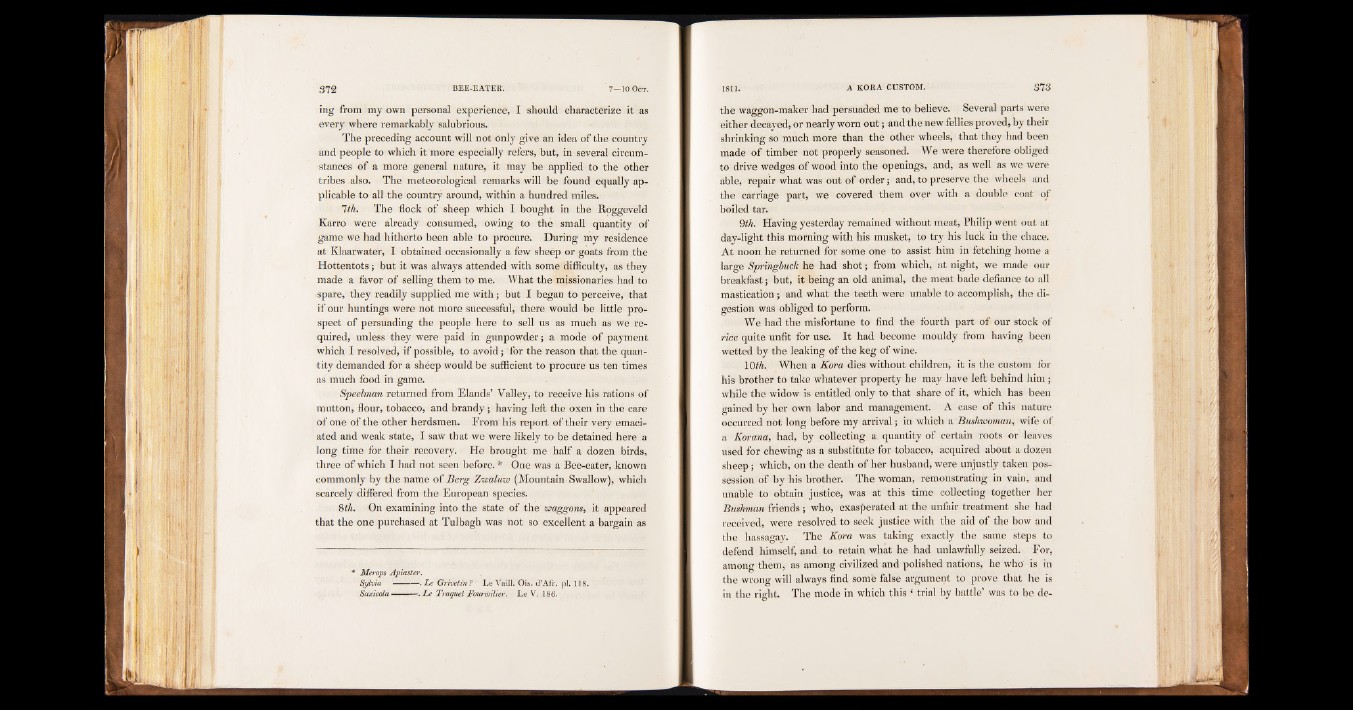
ing from my own personal experience, I should characterize it as
every where remarkably salubrious.
The preceding account will not only give an idea of the country
and people to which it more especially refers, but, in several circumstances
of a more general nature, it may be applied to the other
tribes also. The meteorological remarks will be found equally applicable
to all the country around, within a hundred miles.
7th. The flock of sheep which I bought in the Roggeveld
Karro were already consumed, owing to the small quantity of
game we had hitherto been able to procure. During my residence
at Klaarwater, I obtained occasionally a few sheep or goats from the
Hottentots; but it was always attended with some difficulty, as they
made a favor of selling them to me. What the missionaries had to
spare, they readily supplied me with; but I began to perceive, that
if our huntings were not more successful, there would be little prospect
of persuading the people here to sell us as much as we required,
unless they were paid in gunpowder; a mode of payment
which I resolved, if possible, to avoid; jfor the reason that the quantity
demanded for a sheep would be sufficient to procure us ten times
as much food in game.
Speelman returned from Elands’ Valley, to receive his rations of
mutton, flour, tobacco, and brandy; having left the oxen in the care
of one of the other herdsmen. From his report of their very emaciated
and weak state, I saw that we were likely to be detained here a
long time for their recovery. He brought me half a dozen birds,
three of which I had not seen before. * One was a Bee-eater, known
commonly by the name of Berg Zwaliiw (Mountain Swallow), which
scarcely differed from the European species.
8th. On examining into the state of the waggons, it appeared
that the one purchased at Tulbagh was not so excellent a bargain as
* Merops Apiaster.
Sylvia --------- . Le Grivetin ? Le Vaill. Ois. tl’Afr. pi. 118.
Saxicola — — . Le Traquet Fourmilier. Le V. 186.
the waggon-maker had persuaded me to believe. Several parts were
either decayed, or nearly worn o u t; and the new fellies proved, by their
shrinking so much more than the other wheels, that they had been
made of timber not properly seasoned. We were therefore obliged
to drive wedges of wood into the openings, and, as well as we were
able, repair what was out of order; and, to preserve the wheels and
the carriage part, we covered them over with a double coat of
boiled tar.
9th. Having yesterday remained without meat, Philip went out at
day-light this morning with his musket, to try his luck in the chace.
At noon he returned for some one to assist him in fetching home a
large Springbuck he had shot; from which, at night, we made our
breakfast; but, it being an old animal, the meat bade defiance to all
mastication; and what the teeth were unable to accomplish, the digestion
was obliged to perform.
We had the misfortune to find the fourth part of our stock of
rice quite unfit for use. It had become mouldy from having been
wetted by the leaking of the keg of wine.
10th. When a Kora dies without children, it is the custom for
his brother to take whatever property he may have left behind him ;
while the widow is entitled only to that share of it, which has been
gained by her own labor and management A case of this nature
occurred not long before my arrival; in which a Bushwoman, wife of
a Korana, had, by collecting a quantity of certain roots or leaves
used for chewing as a substitute for tobacco, acquired about a dozen
sheep; which, on the death of her husband, were unjustly taken possession
of by his brother. The woman, remonstrating in vain, and
unable to obtain justice, was at this time collecting together her
Bushman friends; who, exasperated at the unfair treatment she had
received, were resolved to seek justice with the aid of the bow and
the hassaouy. The Kora was taking exactly the same steps to
defend himself, and to retain what he had unlawfully seized. For,
among them, as among civilized and polished nations, he who is in
the wrong will always find some false argument to prove that he is
in the risht. The mode in which this j trial by battle’© was to be de-